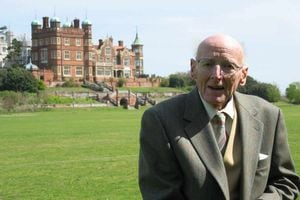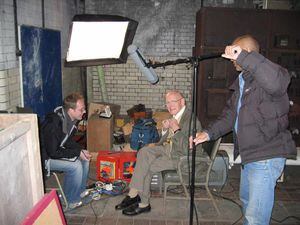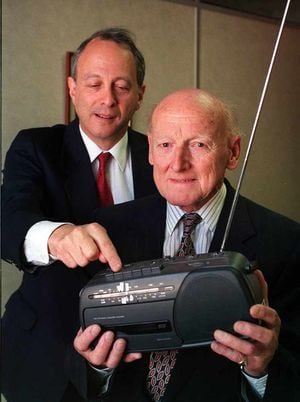Farewell to one of life's great pioneers
One of the pioneers of radar technology that helped Britain win the Second World War has died at the age of 99.

Bernard Blakemore, from Tettenhall, Wolverhampton, was also part of the team that set up Beacon Radio.
Crucially, he was one of the experts that developed radar at a remote country house on the Suffolk coast during the early stages of the war.
His work enabled Britain's pilots to receive early warning signals that would prove crucial in in the Battle of Britain.
Mr Blakemore went on to become one of the trailblazers in commercial radio, launching Wolverhampton's first station, Beacon Radio, in April 1976. He also co-founded The Wolf in 1997. His wife of 64 years, Mary, said her loving husband was a 'dedicated radio buff'.
She said: "His work during the war was something that gave him a great amount of pride. Radio was a big part of his life and to do his bit for the war effort was something he remembered fondly. He was very much a Wolverhampton man. To bring a radio station here was a big thing for Bernard."
Mr Blakemore, who grew up in Newbridge Crescent and attended St Chad's College for boys, joined the BBC in the mid-1930s as an engineer. He was initially based in Daventry, home of the first short wave transmitters of the Empire Service, now known as the BBC World Service.
On September 3, 1939, he was ordered to get every transmitter on full power for an important announcement. A few hours later, Prime Minister Neville Chamberlain broadcast that Britain was at war with Germany.

Mr Blakemore was released for war service the next day and commissioned to the RAF. He was immediately dispatched to Bawdsey Manor, a country house on the Suffolk coast. There he joined Robert Watson-Watt's team that was tasked with developing Radio Direction Finding, later to be known as radar – Britain's secret weapon that would make it possible to detect enemy aircraft by bouncing radio waves off them.
The team perfected radar and built the connections between radar stations and RAF airfields. Their work would prove crucial in the summer of 1940, when this combination of early warning and brave pilots brought victory in the Battle of Britain.
Speaking to the Express & Star in 2011, Mr Blakemore described Bawdsey as 'a magical sort of place'. Following the war he achieved the rank of wing commander and was stationed in Ceylon, where he where he worked on Radio SEAC, broadcasting to allied forces across India and South Asia.
He returned to Wolverhampton and married Mary in 1950, the daughter of Alderman Frank Myatt, a Mayor of Wolverhampton. The couple had three daughters and a son, and now have six grandchildren and a great-grandchild.
Mr Blakemore served on Wolverhampton Council, representing Tettenhall, before joining Associated Television (ATV) as a deputy controller. In 1976 he joined a consortium including former Express & Star editor Clem Jones and founded Beacon Radio, to bring a bright and commercial sound to listeners in the Black Country.

Broadcast from its studios at 267 Tettenhall Road, the station became a major success, expanding in 1987 to cover Shropshire. It was taken over by Orion Media in the late 1990s and recently became Free Radio.
Expressing his sadness at Mr Blakemore's passing, Phil Riley, chief executive of Orion Media, said: "The original entrepreneurs who set up commercial radio in the UK in the early-mid 70s were a hardy bunch. Stations like Beacon really broke the mould, helping create the vibrant commercial radio industry we have today – and Bernard was part of that original band."
Mr Blakemore also held other positions in television and engineering firms during his working life. He died on November 25. The funeral will be a private family affair.
Mary added: "Bernard was very much a family man. He led a full life right to the end and was still interested in politics and current affairs. He will be missed by many people."





